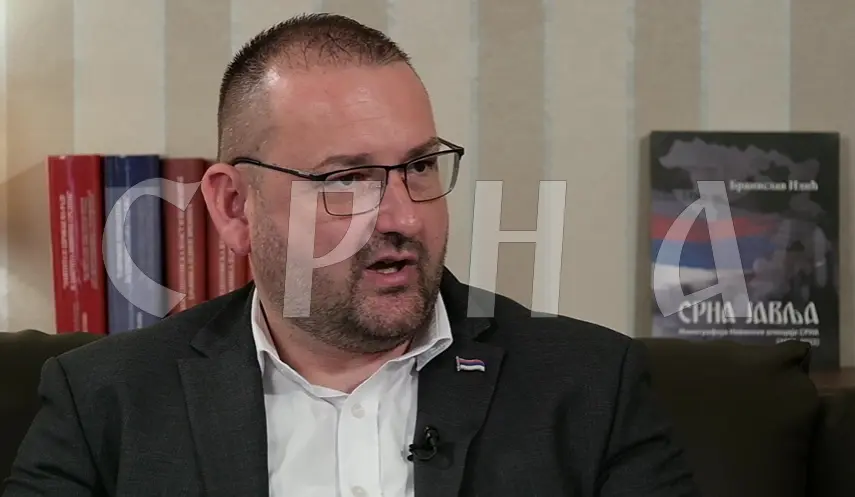EVEN AFTER 30 YEARS, THE CRIMES AGAINST SERBS FROM WESTERN KRAJINA HAVE NOT BEEN PUNISHED
Republika Srpska - Center for Research of War - Nuždić
10/09/2025
12:33

BANJA LUKA, OCTOBER 9 /SRNA/ - The Acting Director of the Republika Srpska Center for Research of War, War Crimes and the Search for Missing Persons, Viktor Nuždić, told SRNA that the Serb population from the Western Krajina municipalities experienced the greatest pogrom in modern history during the summer and autumn of 1995, for which no one has been held accountable, or the proceedings are dragging on indefinitely, as in the case of Atif Dudaković.
On the occasion of the upcoming commemoration of 30 years since the Croatian-Muslim crimes against Serbs in the Krajina municipalities of Republika Srpska in 1995, Nuždić said that what had not been achieved by the Ustasha genocidal policy during the Second World War was accomplished then, the complete eradication of traces of Serb existence in that area.
He reminded that during this pogrom, 120,000 Serbs from Western Krajina were expelled from their ancestral homes.
"The fact that they have not returned to their homes to this day speaks to the continuation of a policy whose goal is to ensure that there are no traces of Serbs in those areas they once predominantly inhabited," Nuždić said.
He pointed out that there have been no judicial proceedings for the crimes committed against Serbs, and even the one launched against the former commander of the Fifth Corps of the so-called Army of BiH Atif Dudaković for crimes against Serbs in Western Krajina, has been dragging on.
"It is unclear when that and other trials will finally be concluded, or whether any of the surviving families of Serb victims will live to see justice," Nuždić pointed out.
He stated that it is the duty of all Republika Srpska institutions to nurture the culture of remembrance so that these crimes are not forgotten, as they serve as a lasting reminder of everything that happened during the Second World War and the most recent Defensive-Patriotic War.
"We plan to implement the project Atlas of Crimes Against Serbs next year, focusing on the events of 1995. It will cover these and other sites of suffering, as well as the pogrom of Serbs that took place in the summer and autumn of 1995," Nuždić said.
The 30th anniversary of the aggression against 13 Western Krajina municipalities and the crimes committed against 2,214 Serb civilians and soldiers by members of the Croatian armed forces and the so-called Army of BiH will be commemorated tomorrow in Mrkonjić Grad. Despite abundant evidence, no one has been adequately punished for these crimes.
The joint forces of the Croatian Army, the Croatian Defense Council /HVO/, and the so-called Army of BiH, supported by NATO operations, carried out an aggression against 13 Western Krajina municipalities in September and October 1995.
The aggression targeted the municipalities of Grahovo, Glamoč, Kupres, Šipovo, Srbobran, Jajce, Ripač, Drvar, Petrovac, Ključ, Krupa na Uni, Sanski Most, and Mrkonjić Grad.
According to data from the Republic Center for Research of War, War Crimes and the Search for Missing Persons, during the aggression, 2,214 Serbs were killed, 120,000 were expelled from their ancestral homes, movable property was looted, and immovable property was destroyed.
Among the victims were 753 Serb civilians, of whom 149 are still listed as missing, as well as 1,461 members of the Republika Srpska Army, of whom 79 remain unaccounted for.
At the Orthodox cemetery in Mrkonjić Grad, the largest mass grave was discovered, from which 181 bodies were exhumed.

SERBS IN TEARS AND FEAR OVER OWNERSHIP OF ORTHODOX CEMETERIES AND CHURCHES

CVIJANOVIĆ DEMANDS ACCOUNTABILITY FOR SHAMEFUL CONCERT IN ŠIROKI BRIJEG

OSTOJIĆ URGES BiH AND EU TO ACT OVER GLORIFICATION OF FASCIST IDEOLOGIES





